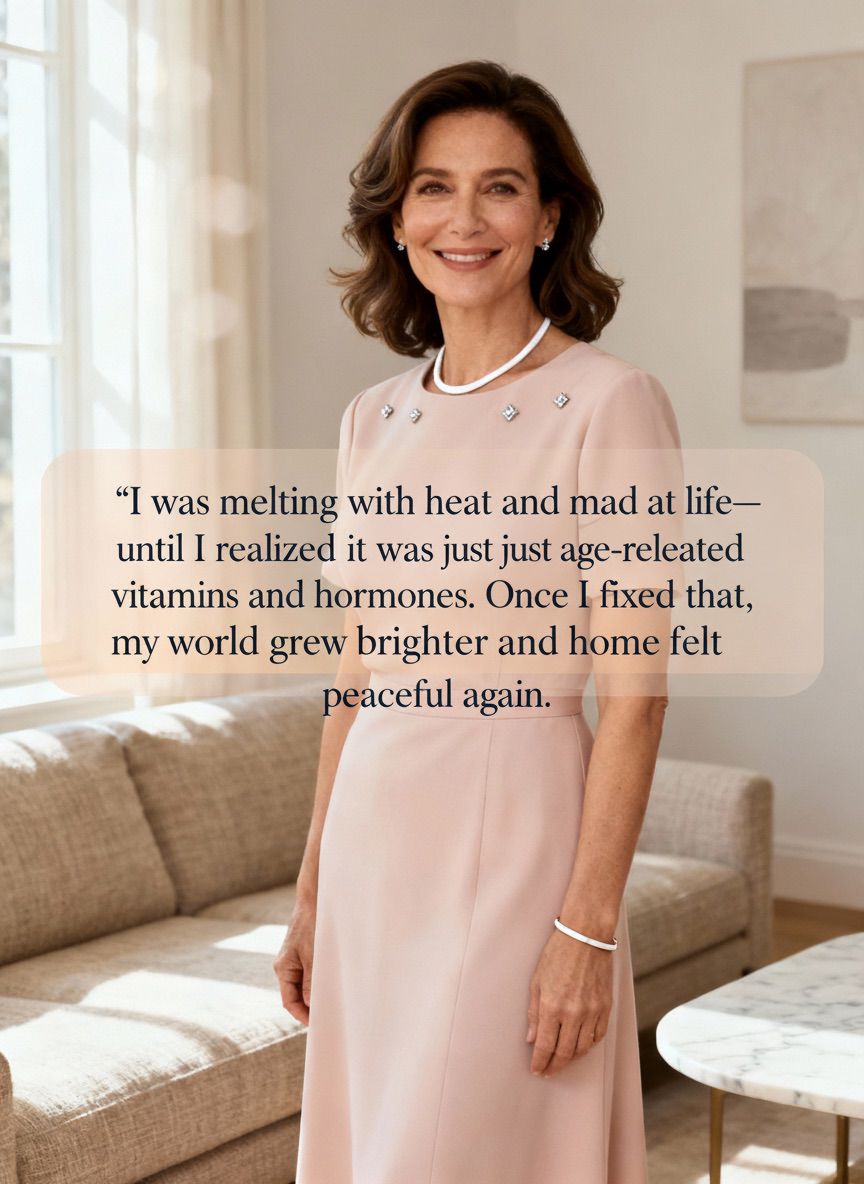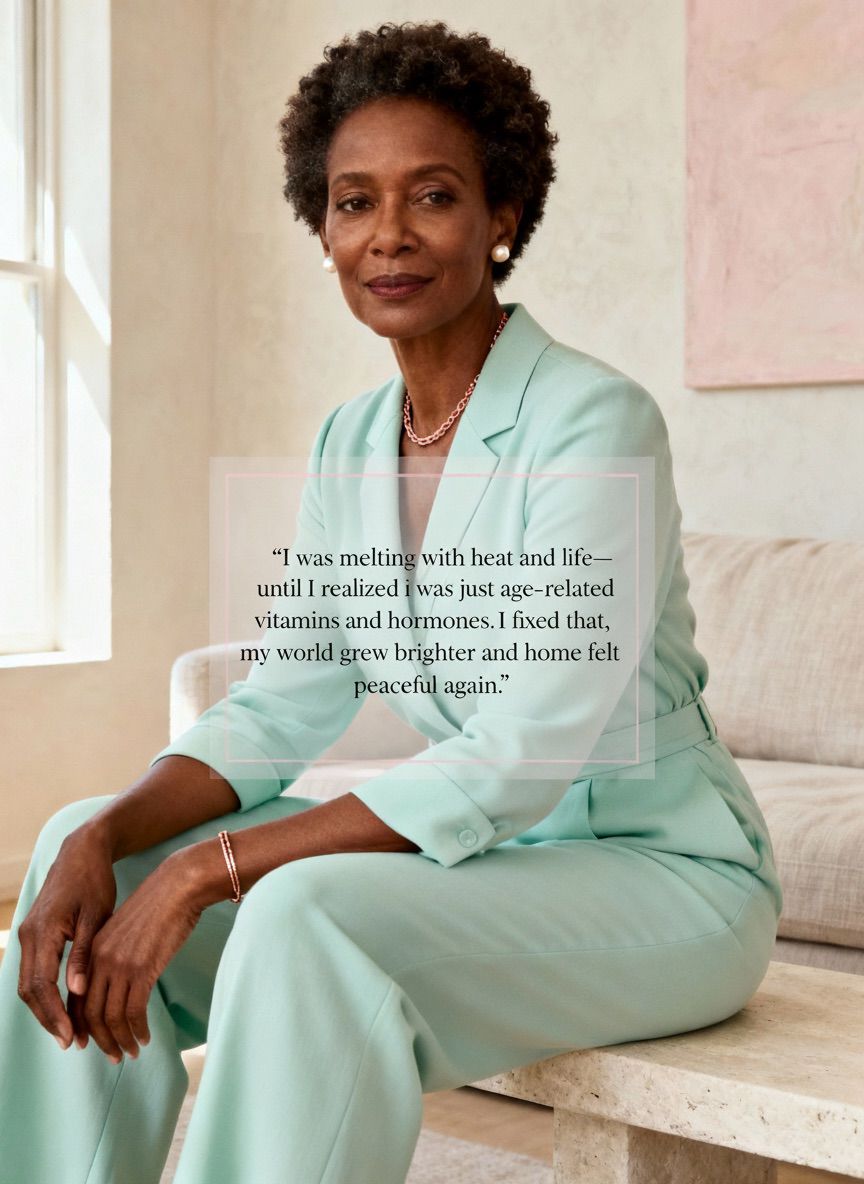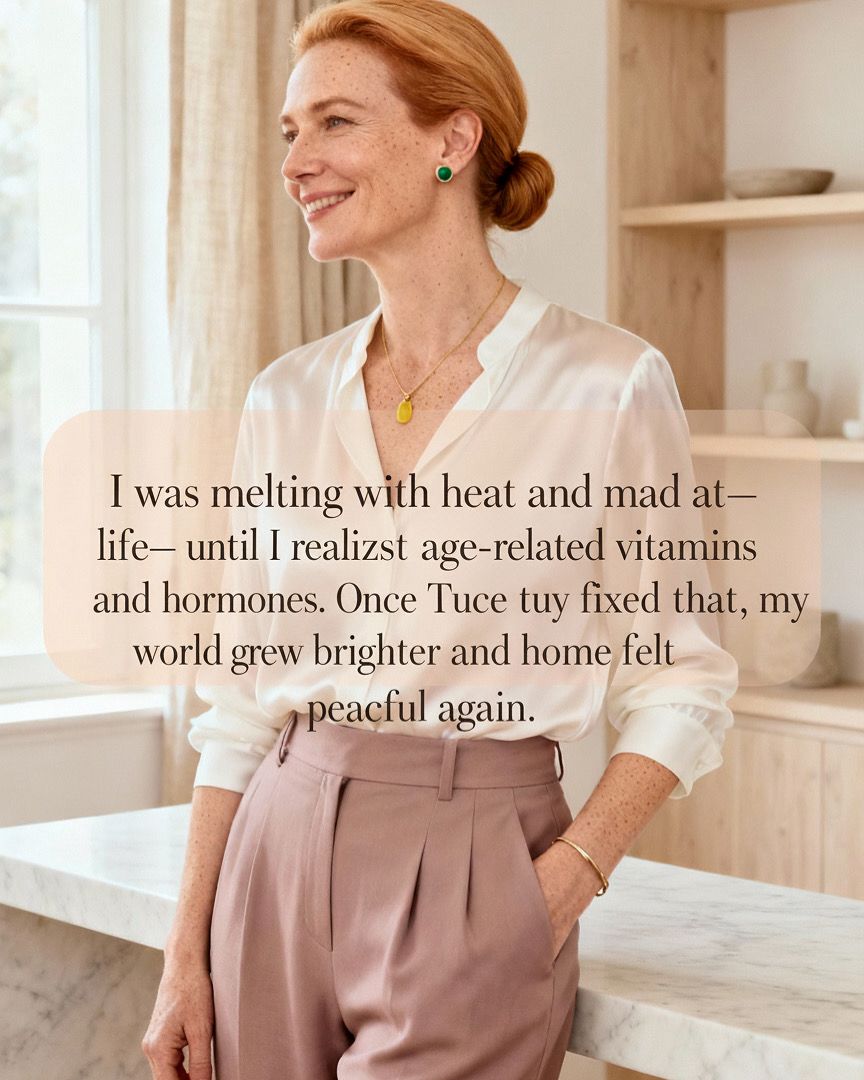
For many women, exhaustion goes beyond the physical — it’s emotional too
It was an ordinary Tuesday when Sarah parked her car in the garage and simply couldn’t get out. Not for lack of will, but because her muscles felt like they weighed tons. At 38, a mother of two and a dedicated professional, she was exhausted in a way she couldn’t explain. It wasn’t just tiredness from work or the domestic routine — it was something deeper, as if a shadow had settled inside her.
Inside the house, the scene was chaotic. The kids were fighting over the remote control, the sink was full of dishes, and her husband, Mark, barely looked up from his phone when she walked in. “You’re late today,” was all he said. Sarah felt a wave of irritation rise in her throat, but she swallowed it. She didn’t have the energy even to argue. She climbed the stairs, locked herself in the bedroom, and started crying — without really knowing why.
In the previous months, something had changed. She couldn’t name it, but she felt it. It was as if she had lost a part of herself along the way. The vibrant woman who loved laughing with her children, who planned trips with her husband, and who excelled at work had disappeared. In her place remained a faded version, irritable and constantly guilty. “Maybe I’m just not the same anymore,” Sarah thought as she wiped away her tears. “Maybe this is just how aging works.”
But deep down, she knew it wasn’t normal to feel this way. Not at 38. Not when everything should be going well. And it was that small internal voice — the one that insisted something was wrong — that led her to begin searching for answers.

Accumulated stress can manifest in unexpected ways in body and mind
The collapse didn’t happen overnight. It was silent, progressive, almost imperceptible. It started with poorly slept nights. Sarah would wake up at 3 AM and couldn’t fall back asleep, her mind ruminating on worries about work, kids, bills. During the day, the fatigue was overwhelming. She drank coffee after coffee, but the energy never really came — it was always an artificial sensation, followed by an even worse crash.
At work, her productivity plummeted. Tasks that used to take an hour now consumed an entire morning. She forgot appointments, missed deadlines, felt her mind foggy. Her colleagues started to notice, but no one said anything — until her boss scheduled a meeting to “align expectations.” Sarah left that encounter feeling like she was failing in every area of life.
At home, the situation wasn’t any better. She would yell at her kids over trivial matters — a spilled glass of juice, a backpack out of place. Afterward came the overwhelming guilt. “What kind of mother am I being?” she questioned herself. Her oldest son, 10 years old, even said: “Mom, you’re always angry now.” Those words pierced her heart like an arrow.
The marriage was suffering too. Mark, who used to be her best friend and confidant, now seemed like a stranger. They barely talked beyond the essentials: “Who’s picking up the kids?”, “Did you pay the electric bill?”. At night, when they finally lay down, he would try to get close, but Sarah would pull away. Not out of lack of love, but because she had nothing to give. She was completely empty.
Sarah tried everything. Guided meditation through apps. Calming teas. Random vitamin supplements she saw in ads. She even considered therapy, but the idea of adding one more thing to her already overloaded schedule exhausted her just thinking about it. Nothing worked. Or rather, nothing seemed to touch the real problem — something she still hadn’t identified.
It was then that, in a moment of desperation, she asked herself: “What if it’s not just in my head? What if my body is trying to tell me something?”

Connection with nature and sunlight can have surprising impacts on wellbeing
The discovery came unexpectedly. On a Saturday afternoon, while mindlessly browsing social media, Sarah came across an article titled “The Forgotten Nutrient That May Be Affecting Your Mood.” Normally, she would ignore this type of content — after all, she had seen dozens of miracle promises that never worked. But something about that headline intrigued her. Maybe it was desperation, or maybe intuition. She clicked.
The article talked about vitamin D, but not in the cliché way she expected. It wasn’t about bones or the immune system. It was about mood, energy, sleep regulation. It spoke of how inadequate sun exposure and deficiency of certain micronutrients could be linked to symptoms like chronic fatigue, irritability, and even cognitive difficulties. Sarah read it with wide eyes. It was as if they were describing her life.
She started researching more. She found scientific studies — not dubious websites, but publications from NIH, Harvard, Cleveland Clinic — that explored the relationship between adequate vitamin D levels and emotional wellbeing. [1][2][3] Of course, none of them promised miracle cures. They were cautious studies, full of “may be associated with” and “suggests a correlation.” But it was enough to spark her curiosity.
Sarah stopped to think: when was the last time she had spent 15 minutes in the sun? Her office had no windows. She left home before dawn and returned at dusk. On weekends, she was always busy with household chores or taking the kids to activities in indoor environments. Her skin was pale, almost translucent. She could barely remember the feeling of the sun’s warmth on her face.
But there was more. She realized her diet had become chaotic. Coffee and cookies for breakfast. Frozen food for lunch. Late dinner, usually something heavy that left her bloated and uncomfortable. She drank little water, slept poorly, and her body was clearly crying for help — she just hadn’t stopped to listen.
Sarah decided to run an experiment. Nothing radical, nothing extreme. Just small changes. The next day, she woke up 20 minutes earlier and, before anything else, went out to the backyard. She stood there, still, feeling the morning sun warm her face. She didn’t do anything besides that. Didn’t check her phone, didn’t think about the to-do list. Just existed for 15 minutes. It was strange at first, almost uncomfortable. But it was also liberating.
She started adjusting other things too. She bought fresh fruits and leafy greens. Swapped excessive coffee for lemon water. At night, before sleeping, she began writing three things she was grateful for — however small. At work, she forced herself to take small breaks, standing up and stretching every hour.
She didn’t expect miracles. In fact, part of her doubted anything would change. But she decided to try anyway. After all, what did she have to lose?

Small consistent changes can create profound transformations
The change wasn’t instantaneous. There was no dramatic moment of revelation or sudden cure. But about two weeks after starting her new routine, Sarah noticed something: she had slept through the entire night. All of it. Without waking up at 3 AM. Without tossing and turning for hours. She opened her eyes when the alarm went off and, for the first time in months, she felt… rested.
In the following days, other signs began to appear. Her irritability decreased. She still had moments of stress — after all, life hadn’t magically changed — but she no longer exploded at her kids over everything. She could take a deep breath, count to three, and respond with patience. Her oldest son noticed. “Mom, you’re cooler now,” he said casually during dinner. Sarah felt her eyes well up, but with gratitude.
At work, her mind was clearer. Tasks that used to seem like insurmountable mountains were now just… tasks. Manageable. She met deadlines, actively participated in meetings, and even had a creative idea that impressed her team. Her boss walked by her desk and said: “Good to have you back.” He didn’t even know how much those words meant to her.
But the most significant change happened at home. One night, after the kids went to sleep, Mark approached her in the kitchen while she was washing dishes. “You’re different,” he said, with a shy smile. “It’s like… my Sarah came back.” She stopped, dried her hands, and hugged him. For the first time in a long while, the embrace was genuine, without barriers, without exhaustion. That night, they talked for hours — about everything and nothing. They laughed together. And Sarah realized she hadn’t lost the marriage. She had lost herself.
Sarah didn’t know if it was the minutes of morning sun, the more balanced diet, the water, the work breaks, or the gratitude practice. It was probably all of it together. But what she knew, with absolute certainty, was that something had changed. And she wasn’t willing to go back.
She started sharing her experience with friends. Not in a preachy or arrogant way, but simply telling her story. And she was surprised to discover how many of them were feeling the same. Unexplained exhaustion. Irritability. The feeling of losing control. “I thought it was just me,” a friend confessed. “I thought I was failing as a mother, as a wife, as a person.”
Sarah realized something important: so many women are carrying this silent weight, believing the problem is with them, when in reality their bodies are just asking for attention. Care. Respect.

Reconnecting with yourself is the first step to transformation
Today, six months later, Sarah doesn’t consider herself a “new woman.” She didn’t go through a magical transformation or discover a universal secret. What she did was much simpler — and perhaps because of that, much more powerful. She relearned to listen to herself.
There are still difficult days. Days when fatigue comes, when patience runs out, when everything seems too much. But now she recognizes the signs. She knows when she needs to slow down, when she needs 15 minutes of sun, when she needs a glass of water and a deep breath. She no longer ignores what her body is saying.
She realized that, for years, she had treated her body like a machine that should function perfectly without maintenance. She worked long hours, skipped meals, slept poorly, and expected everything to keep working. And when it started to fail, she thought the problem was her — her weakness, her inability. But it wasn’t. It was just a body asking for care.
Sarah also understood that her journey wasn’t about blaming anyone — not herself, not her husband, not work. It was about responsibility. About realizing that no one would come to save her. That she needed to be her own hero. And that saving herself didn’t mean doing something grand, but rather making small daily choices of self-love.
Her marriage is stronger than ever. Not because everything is perfect, but because she is present. She can see Mark, really see him, instead of looking through him in a state of exhaustion. They’ve returned to making plans, dreaming together, laughing at small things.
Her children have their mother back. A mother who plays, who smiles, who has the patience to listen about their day. A mother who isn’t perfect, but is present. And that, Sarah discovered, is more than enough.
At work, she’s shining again. Not because she works more hours or sacrifices more, but because she works better. With focus, with energy, with mental clarity. And that has made her not only more productive, but also happier.

Inner rebirth begins when we decide to listen to ourselves
If you’re reading this and see yourself in Sarah’s story, know that you’re not alone. Millions of women are going through the same thing — silently, believing the problem is with them, when in reality it’s with the way we’re living.
There’s no magic formula. There’s no single villain or single solution. But there is a simple truth: your body speaks. It always speaks. The question is whether we’re listening.
Maybe it’s the lack of sun. Maybe it’s nutrition. Maybe it’s stress, sleep, dehydration. Maybe it’s all of these together. But before giving up on yourself, before believing this is just how things are, stop. Breathe. And ask your body: what do you need from me?
The answer may be simpler than you imagine. And the impact, greater than you ever dreamed.
Frequently Asked Questions
1. Why do so many women over 35 experience unexplained fatigue?
Many factors can contribute to persistent tiredness in women over 35, including hormonal fluctuations, lifestyle changes, inadequate sun exposure, poor sleep quality, and nutritional gaps. Our modern indoor lifestyles often mean we’re not getting the natural elements our bodies evolved to need, such as regular sunlight and movement throughout the day.
2. How does sunlight exposure affect mood and energy levels?
Sunlight plays a crucial role in regulating our circadian rhythm and supporting the production of important compounds in our body. Morning sun exposure particularly helps set our internal clock, which can improve sleep quality, mood regulation, and daytime energy. Studies suggest that just 15-20 minutes of natural light daily may support overall wellbeing.
3. Can lifestyle changes really make a difference, or is this just aging?
While aging is natural, many symptoms we attribute to getting older are actually related to lifestyle factors. Research shows that simple changes like regular sun exposure, better hydration, improved nutrition, and consistent sleep patterns can significantly impact how we feel. Many women report feeling more energetic and mentally clear after adjusting these basic habits.
4. What are the signs that my body needs more attention?
Common signs include persistent fatigue despite adequate sleep, unexplained irritability, difficulty concentrating, low motivation, changes in sleep patterns, and feeling disconnected from activities you once enjoyed. If you’re experiencing several of these symptoms consistently, it may be time to evaluate your daily habits and consider speaking with a healthcare professional.
5. How long does it take to notice improvements from lifestyle changes?
Everyone’s experience is different, but many people report noticing subtle changes within 2-3 weeks of consistent habit adjustments. Better sleep often comes first, followed by improved mood and energy. Significant transformations typically become apparent after 4-8 weeks of maintaining new healthy practices.
6. Is it safe to get sun exposure daily?
Moderate sun exposure is generally beneficial and safe for most people. Experts suggest 15-20 minutes of morning or late afternoon sun on exposed skin (arms, face) several times per week. This timing typically avoids the harshest midday rays. Those with specific skin concerns should consult with their healthcare provider for personalized guidance.
7. What dietary changes support better energy and mood?
A balanced approach includes plenty of fresh fruits and vegetables, leafy greens, whole grains, healthy fats from sources like fish and nuts, and adequate hydration. Reducing processed foods, excessive caffeine, and sugar can also help stabilize energy levels throughout the day. Small, consistent improvements often work better than dramatic dietary overhauls.
8. Can stress alone cause these symptoms?
Chronic stress can certainly contribute to fatigue, irritability, and cognitive fog. However, stress often interacts with other factors like poor sleep, inadequate nutrition, and lack of sunlight to create a cumulative effect. Addressing multiple lifestyle factors simultaneously tends to be more effective than focusing on stress alone.
9. Should I consider nutritional support?
Many people find that ensuring adequate intake of essential nutrients supports their overall wellbeing. This can often be achieved through dietary improvements and lifestyle changes. If you’re considering nutritional support options, it’s important to discuss this with a qualified healthcare professional who can evaluate your individual needs and recommend appropriate approaches.
10. When should I seek professional guidance?
If symptoms persist despite lifestyle changes, interfere significantly with daily functioning, or include concerning signs like severe mood changes or physical symptoms, it’s important to consult with a healthcare provider. They can help rule out underlying conditions and provide personalized recommendations based on your specific situation.
Scientific References
- National Institutes of Health (NIH) – “Vitamin D and Mental Health: A Review” https://www.ncbi.nlm.nih.gov/pmc/articles/PMC6982793/
- Harvard Health Publishing – “How to improve your mood with sunlight” https://www.health.harvard.edu/mind-and-mood/how-to-improve-your-mood-with-sunlight
- Cleveland Clinic – “The Benefits of Getting Outside and Vitamin D” https://health.clevelandclinic.org/why-you-need-more-sunlight/
- Journal of Affective Disorders – “Serum Vitamin D Levels and Symptoms of Depression in Adults” https://www.sciencedirect.com/science/article/abs/pii/S0165032717312673
Join Thousands of Women Rediscovering Their Energy
This gentle method gave me back the vitality I thought was gone forever





